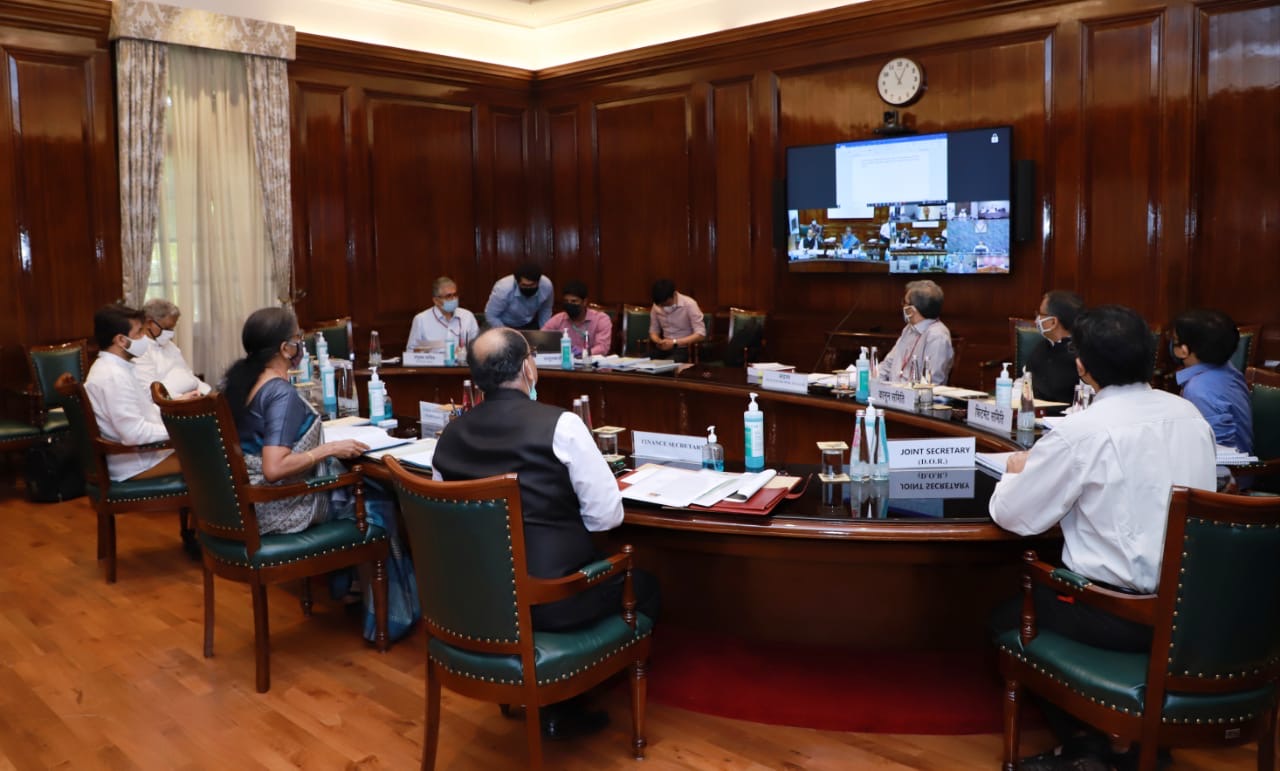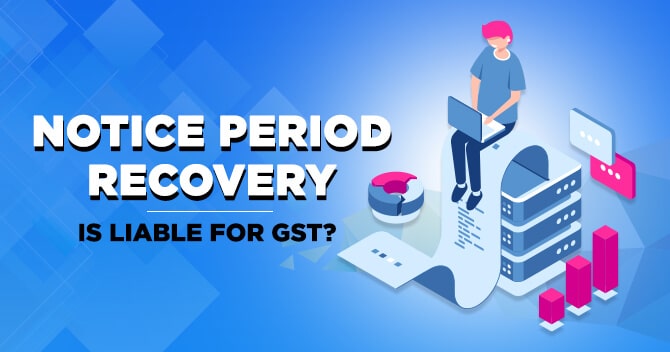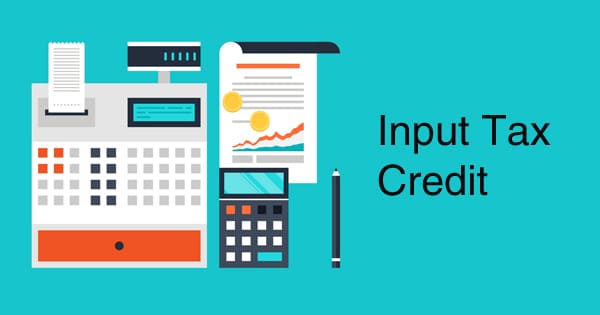The much awaited 42nd meeting of the GST Council, headed by Finance Minister Nirmala Sitharaman and comprising state counterparts, was held today via video conferencing. The meet was expected to be turned thorny, with non-BJP ruled states still being in disagreement with the Centre on the compensation issue.
After lengthy deliberations made in the Council Meeting, the virtual media briefing was given by by the FM.
The key takeaways based upon the said virtual media briefing which include enhancement in features of GST return filing, allowing quarterly filing of GSTR-3B etc is summarized below for ready reference of our readers.
Key Takeaways from the GST Council Meeting
1. Hiking the borrowing limit under Option 1:
In its last meeting, the council gave its member states two borrowing options. The first option allowed states to borrow the tax collection shortfall on account of GST implementation estimated at Rs 97,000 crore by issuing debt under a special window coordinated by the Finance ministry. The second option allowed states to borrow the Rs 2.35 lakh crore shortfall, including the shortfall due to the COVID-19 pandemic, by issuing market debt.
As many as 21 states are in favour of the first option. This puts the centre on a stronger footing in case the issue is out to vote in the GST Council. Under the GST act, only 20 states were needed to pass any resolution during voting.
The GST Council agreed to hike the borrowing limit under Option 1 to Rs 1.10 lakh cr based on 7% growth rate, as against Rs 97,000 cr borrowing in Option 1 based on 10% revenue growth.
It was announced by FM that Rs 24,000 crore of IGST to be released to the states — which had received less earlier — will be disbursed by the end of next week.
2. Opposition states pushed for a third option for Centre to borrow: Issue not resolved: Another meeting on 12th October,2020
While as many as 21 states, mostly ruled by BJP or parties which have supported it on issues, had till mid-September opted to borrow Rs 97,000 crore to meet the GST revenue shortfall in the current fiscal, opposition-led states like West Bengal, Punjab and Kerala have not yet accepted the borrowing option given by the Centre and they were of the opinion that Centre should borrow.
After detailed deliberation the issue could not be resolved and the matter will again be discussed on 12th of October,2020.
3. Opposition States pushed for a dispute resolution mechanism which was rejected by Centre
Objecting to the Centre’s two borrowing options offered and what the states are looking at as a “threat” that there would be no compensation if they do not opt for either, Opposition-ruled states demanded in the meet that a dispute redressal mechanism be activated and a vice-chairperson be appointed to GST Council.
However the demand of Dispute Resolution Authority was rejected by Centre stating that setting up such Authority is against tenets of Constitution & Council. Centre said in the meet that Constitutional Amendment did not approve setting up of Dispute Resolution Authority.
It may be noted here that such a proposal is not new as a similar proposal was mooted In 2011. It was rejected by then Parliament Standing Committee On Fin headed By Yashwant Sinha.
4. GST Council decides to extend the period of levy of Compensation cess on sin & luxury goods
It may be noted here that as per current provisions the cess is to be charged for a period of 5 years till June 2022. It was expected that the cess period will be increased from 5 years to 7 years. However GST Council decided that extension timeline to be reviewed and decided from time to time.
In regard to the cess collected beyond 5 years , first charge will be towards interest on above Rs 1.10 lakh crore and next 50% towards principal amount of Rs 1.10 lakh crore and left over towards compensation not being borrowed.
5. Enhancement in features of return filing:
With a view to enhance Ease of Doing Business and improve the compliance experience, the Council has approved the future roadmap for return filing under GST.
The approved framework aims to simplify return filing and further reduce the taxpayer’s compliance burden in this regard significantly, such that the timely furnishing of details of outward supplies (GSTR-1) by a taxpayer and his suppliers would –
(i) allow him to view the ITC available in his electronic credit ledger from all sources i.e. domestic supplies, imports and payments on reverse charge etc. prior to the due date for payment of tax, and
(ii) enable the system to auto-populate return (GSTR-3B)through the data filed by the taxpayer and all his suppliers.
In other words, the timely filing of the GSTR-1 statement alone would be sufficient as the return in FORM GSTR-3B would get auto prepared on the common portal.
To this end the Council recommended/decided the following:
a. Due date of furnishing quarterly GSTR-1 by quarterly taxpayers to be revised to 13th of the month succeeding the quarter w.e.f. 01.1.2021;
b. Roadmap for auto-generation of GSTR-3B from GSTR-1s by:
i. Auto-population of liability from own GSTR-1 w.e.f. 01.01.2021; and
ii. Auto-population of input tax credit from suppliers’ GSTR-1s through the newly developed facility in FORM GSTR-2B for monthly filers w.e.f. 01.01.2021 and for quarterly filers w.e.f. 01.04.2021;
c. In order to ensure auto population of ITC and liability in GSTR 3B as detailed above, FORM GSTR 1 would be mandatorily required to be filed before FORM GSTR-3B w.e.f. 01.04.2021.
d. The present GSTR-1/3B return filing system to be extended till 31.03.2021 and the GST laws to be amended to make the GSTR-1/3B return filing system as the default return filing system.
6. Allowing quarterly filing of GSTR-3B
The 42nd GST Council Meeting held today has decided to allow the quarterly filing GSTR-3B returns having less than five crores turnover.
This facility will be available from January 1st, 2021. From Jan 2021, the number of returns for small taxpayers will be reduced from 24 to 8.
However , payment of tax would be made monthly through challan. Such quarterly taxpayers would, for the first two months of the quarter, have an option to pay 35% of the net cash tax liability of the last quarter using an auto-generated challan.
Further for such taxpayers , a facility to only upload outward supply invoices would be provided.
7 Requirement of mentioning HSN on tax invoice / GST returns:
For taxpayers with aggregate turnover of more than Rs 5 crores, HSN code is to be mentioned at 6-digit level and for others making B2B supplies, HSN is to be mentioned at 4-digit level.
Further for notified classes of supplies, 8 digits will be required to be mentioned. These requirement will be effective from 01.04.2021.
8. Lower rate for Ayurvedic hand sanitizers: Proposal rejected by GST Council
The council considered lowering the rate on ‘Ayurvedic’ hand sanitizers to 18 percent from 12 percent. However GST Council rejected the proposal as it would be difficult proposition to differentiate between ayurvedic and normal sanitizers.
9. GST exemption on the launch of satellite services
To encourage domestic launching of satellites particularly by young start-ups, the council has exempted the launch of satellite services supplied by ISRO, Antrix Corp., and New Space India Ltd. from the GST. Currently, the supply of satellite launch services by ISRO, Antrix, or NSIL to a person located in India is taxable at 18 percent.
10. Disbursement of refund
From 1st January, 2021, refund would be disbursed to only those bank accounts which are validated with PAN and Aadhaar. Further refund applications can now be signed through Aadhaar authentication via OTP.
11. Amendment to the CGST Rules:
Various amendments in the CGST Rules and FORMS have been recommended which includes provision for furnishing of Nil FORM CMP-08 through SMS.
READ / DOWNLOAD PRESS RELEASE:
***
[rainbow]Don’t miss the next GST Update / Article / Judicial pronouncement[/rainbow]
Subscribe to our newsletter from FREE to stay updated on GST Law
Resolve your GST queries from national level experts on GST free of cost.
Frah Saeed is a law graduate specializing in the core field of indirect taxes and is the Co-founder of taxwallah.com. She has authored many publications on GST and is into full-time consultancy on GST to big corporates. She as a part of taxwallah.com heads a team comprising of Chartered Accountants and Advocates and plays a key role in our mission to disseminate GST knowledge to all.



